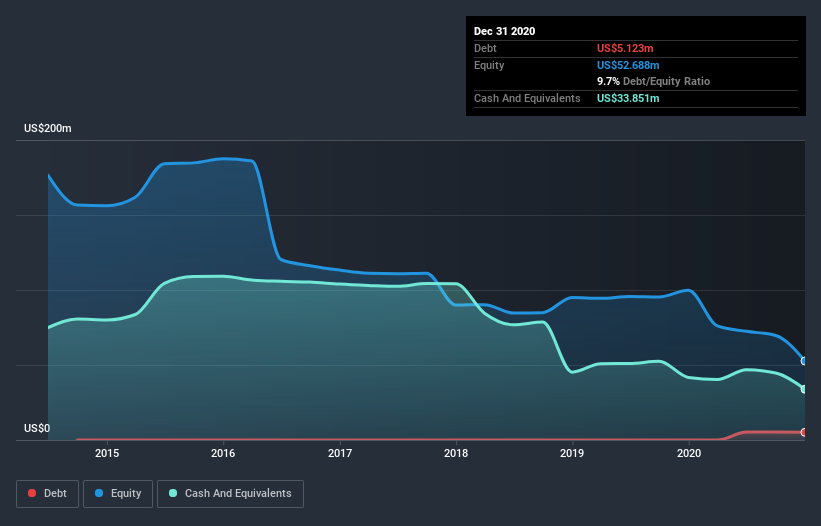Warren Buffett famously said, 'Volatility is far from synonymous with risk.' It's only natural to consider a company's balance sheet when you examine how risky it is, since debt is often involved when a business collapses. We can see that Marchex, Inc. (NASDAQ:MCHX) does use debt in its business. But the real question is whether this debt is making the company risky.
What Risk Does Debt Bring?
Generally speaking, debt only becomes a real problem when a company can't easily pay it off, either by raising capital or with its own cash flow. Part and parcel of capitalism is the process of 'creative destruction' where failed businesses are mercilessly liquidated by their bankers. While that is not too common, we often do see indebted companies permanently diluting shareholders because lenders force them to raise capital at a distressed price. Of course, debt can be an important tool in businesses, particularly capital heavy businesses. The first thing to do when considering how much debt a business uses is to look at its cash and debt together.
See our latest analysis for Marchex
What Is Marchex's Debt?
As you can see below, at the end of December 2020, Marchex had US$5.12m of debt, up from none a year ago. Click the image for more detail. But it also has US$33.9m in cash to offset that, meaning it has US$28.7m net cash.

How Strong Is Marchex's Balance Sheet?
We can see from the most recent balance sheet that Marchex had liabilities of US$21.0m falling due within a year, and liabilities of US$3.29m due beyond that. Offsetting these obligations, it had cash of US$33.9m as well as receivables valued at US$6.33m due within 12 months. So it actually has US$15.9m more liquid assets than total liabilities.
This surplus suggests that Marchex has a conservative balance sheet, and could probably eliminate its debt without much difficulty. Succinctly put, Marchex boasts net cash, so it's fair to say it does not have a heavy debt load! When analysing debt levels, the balance sheet is the obvious place to start. But it is future earnings, more than anything, that will determine Marchex's ability to maintain a healthy balance sheet going forward. So if you want to see what the professionals think, you might find this free report on analyst profit forecasts to be interesting.
In the last year Marchex had a loss before interest and tax, and actually shrunk its revenue by 6.9%, to US$51m. We would much prefer see growth.
So How Risky Is Marchex?
By their very nature companies that are losing money are more risky than those with a long history of profitability. And we do note that Marchex had an earnings before interest and tax (EBIT) loss, over the last year. And over the same period it saw negative free cash outflow of US$4.7m and booked a US$42m accounting loss. But the saving grace is the US$28.7m on the balance sheet. That means it could keep spending at its current rate for more than two years. Even though its balance sheet seems sufficiently liquid, debt always makes us a little nervous if a company doesn't produce free cash flow regularly. There's no doubt that we learn most about debt from the balance sheet. However, not all investment risk resides within the balance sheet - far from it. To that end, you should be aware of the 2 warning signs we've spotted with Marchex .
Of course, if you're the type of investor who prefers buying stocks without the burden of debt, then don't hesitate to discover our exclusive list of net cash growth stocks, today.
If you decide to trade Marchex, use the lowest-cost* platform that is rated #1 Overall by Barron’s, Interactive Brokers. Trade stocks, options, futures, forex, bonds and funds on 135 markets, all from a single integrated account. Promoted
New: Manage All Your Stock Portfolios in One Place
We've created the ultimate portfolio companion for stock investors, and it's free.
• Connect an unlimited number of Portfolios and see your total in one currency
• Be alerted to new Warning Signs or Risks via email or mobile
• Track the Fair Value of your stocks
This article by Simply Wall St is general in nature. It does not constitute a recommendation to buy or sell any stock, and does not take account of your objectives, or your financial situation. We aim to bring you long-term focused analysis driven by fundamental data. Note that our analysis may not factor in the latest price-sensitive company announcements or qualitative material. Simply Wall St has no position in any stocks mentioned.
*Interactive Brokers Rated Lowest Cost Broker by StockBrokers.com Annual Online Review 2020
Have feedback on this article? Concerned about the content? Get in touch with us directly. Alternatively, email editorial-team (at) simplywallst.com.
About NasdaqGS:MCHX
Marchex
A conversation intelligence company, provides conversational analytics and related solutions in the United States, Canada, and internationally.
Flawless balance sheet with very low risk.
Similar Companies
Market Insights
Community Narratives


Recently Updated Narratives


No miracle in sight


Q3 Outlook modestly optimistic


Alphabet: The Under-appreciated Compounder Hiding in Plain Sight
Popular Narratives


The company that turned a verb into a global necessity and basically runs the modern internet, digital ads, smartphones, maps, and AI.


MicroVision will explode future revenue by 380.37% with a vision towards success



